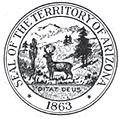7th Arizona Territorial Legislature
 From Wikipedia - Reading time: 6 min
From Wikipedia - Reading time: 6 min
| Arizona Territorial Legislature | |||||
|---|---|---|---|---|---|
| |||||
| Overview | |||||
| Legislative body | Arizona Territorial Legislature | ||||
| Jurisdiction | Arizona Territory, United States | ||||
| Council | |||||
| Members | 9 | ||||
| House of Representatives | |||||
| Members | 18 | ||||
The 7th Arizona Territorial Legislative Assembly was a session of the Arizona Territorial Legislature which convened on January 6, 1873, in Tucson, Arizona Territory.[1]
Background
[edit]The Indian Wars continued within Arizona Territory. Dissatisfied with the situation, Governor Anson P.K. Safford and Territorial Delegate to Congress Richard C. McCormick had successfully lobbied for a replacement to General George Stoneman as commander of the District of Arizona. Replacing the general was Colonel George Crook who was bringing new methodologies to the fight.[2]
Following the establishment of a public school system by the previous legislature, Arizona's first public school had opened in March 1872.[3] On a more private level, Governor Safford and his wife Jenny had experienced a public falling out of their marriage following the death of their infant son. The situation had escalated to the point where she had printed and distributed pamphlets claiming he had committed marital infidelity and contracted a venereal disease.[4]
Legislative session
[edit]The legislative session began on January 6, 1873.
Governor's address
[edit]Governor Safford gave his address to the session on January 17, 1873.[5] In regards to the Apache situation, he stated "The hostility of Indians strikes at the life of our people, retards immigration, prevents development of our resources, and impoverishes the masses."[5]
In more mundane matters, Safford reported on the need to revise the territorial legal code, build a prison, and make provisions for the care of the insane. He also declared Arizona's "great diamond mine" a hoax.[6]
Legislation
[edit]Among the session’s accomplishments was the transfer of a section of Pima County to Maricopa County.[7] They also changed the name of Arizona City to Yuma.[7]
The legislature authorized Governor Safford to print an immigration pamphlet promoting the territory.[7] They also passed a resolution to commend General Crook.[7]
Finally the legislature passed granted a divorce to the Governor and his wife.[4]
Members
[edit]| House of Representatives[8] | ||||
|---|---|---|---|---|
| Name | District | Name | District | |
| John Brackett Allen | Pima | John Montgomery | Pima | |
| John H. Behan | Yavapai | Granville H. Oury (Speaker) | Maricopa | |
| C. H. Brinley | Yuma | J. M. Redondo | Yuma | |
| William Cole | Yavapai | C. W. C. Rowell | Yuma | |
| William C. Davis | Pima | John T. Smith | Pima | |
| George Gleason | Mohave and Yuma | Thomas Stonehouse | Yavapai | |
| Fred Henry | Yavapai | John W. Sweeney | Pima | |
| Lionel M. Jacobs | Pima | J. S. Vosburg | Pima | |
| F. M. Larkin | Pima | Henry Wickenburg | Yavapai | |
| Council[8] | |
|---|---|
| Name | District |
| Mark Aldrich | Pima |
| Thomas J. Bidwell | Yuma |
| Juan Elías | Pima |
| J. P. Hargrave (President) | Yavapai |
| W. F. Henning | Yuma and Mohave |
| A. O. Noyes | Yavapai |
| Levi Ruggles | Pima |
| Hiram S. Stevens | Pima |
| King Woolsey | Yavapai and Maricopa |
References
[edit]- ^ McClintock 1916, p. 371.
- ^ Wagoner 1970, p. 103.
- ^ Wagoner 1970, p. 107.
- ^ a b Goff 1978, p. 51.
- ^ a b Wagoner 1970, p. 138.
- ^ Goff 1978, p. 57.
- ^ a b c d McClintock 1916, p. 330.
- ^ a b Wagoner 1970, p. 511.
- Goff, John S. (1978). Arizona Territorial Officials Volume II: The Governors 1863–1912. Cave Creek, Arizona: Black Mountain Press. OCLC 5100411.
- McClintock, James H. (1916). Arizona, Prehistoric, Aboriginal, Pioneer, Modern Vol. II. Chicago: S. J. Clarke.
- Wagoner, Jay J. (1970). Arizona Territory 1863–1912: A Political history. Tucson: University of Arizona Press. ISBN 0816501769.
Further reading
[edit]- Arizona Territory (1873). Acts, Resolutions and Memorials Adopte by the Seventh Legislative Assembly of the Territory of Arizona. Tucson: Arizona Citizen. OCLC 704896910.
 KSF
KSF